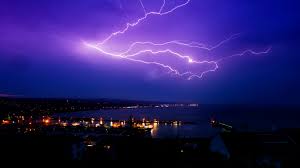
Everything modern science has established about clouds and has to say about the causes of thunder and lightning is in complete accord with the descriptions in the Qur’an.
The Formation of Hail, Thunder and Lightning
“… He sends down mountains from the sky with hail inside them, striking with it anyone He wills and averting it from anyone He wills. The brightness of His lightning almost blinds the sight.” (An-Nur 24:43)
The above verse refers to hail and lightning. When the formation of hail and lightning are examined, it can be seen that an important meteorological truth is being indicated in this verse. About the formation of lightning and hail, the book Meteorology Today says that a cloud becomes electrified as hail falls through a region in the cloud of supercooled droplets and ice crystals. Liquid droplets freeze and release latent heat as they collide with a hailstone.
This keeps the surface of the hailstone warmer than that of the surrounding ice crystals. An important phenomenon occurs when the hailstone comes in contact with an ice crystal: Electrons flow from the colder object toward the warmer one. In this way, the hailstone becomes negatively charged. This effect also occurs when supercooled droplets come in contact with a hailstone and small pieces of positively charged ice break off.
These particles, which are lighter and positively charged, are carried to the upper part of the cloud by currents of air. The hail has a negative charge now and falls towards the bottom of the cloud, thus the lower part of the cloud becomes negatively charged. These negative charges are then discharged as lightning. It may be concluded from this that hail is the main factor in the formation of lightning.1
In the following verse, however, attention is drawn to the link between rain clouds and lightning, and to the order of formation, information that parallels that discovered by science:
“Or [their likeness is] that of a storm-cloud in the sky, full of darkness, thunder and lightning. They put their fingers in their ears against the thunderclaps, fearful of death…” (Al-Baqarah 2:19)
Rain clouds are tremendous masses covering 20 to 260 square meters (10 to 100 square miles) and reaching great vertical heights of 9,000 to 12,000 meters (30,000 to 40,000 ft.). Due to these extraordinary dimensions, the lower part of these clouds is dark. It is impossible for the Sun’s rays to pass through them, because of the large quantities of water and ice particles they contain. Very little solar energy, therefore, reaches the Earth through the clouds, which is why the clouds appear dark to someone looking up at them.2
The stages of the formation of thunder and lightning after that darkness, mentioned in the verse, are as follows: An electrical charge forms inside the rain cloud. This comes about as a result of such processes as freezing, the division of raindrops and charge formation during contact. The accumulation of such electrical charges, when the air between becomes unable to insulate them, leads to a great spark, a discharge between the positive and negative fields. The voltage between two oppositely charged areas can reach 1 billion volts.
 The spark can also form within the cloud, can cross between two clouds, from a positively charged area to a negative one, or be discharged from the cloud to the ground. These sparks form dazzling lightning strikes. This sudden increase in the electrical charge along the line of lightning causes intense heat (10,000 degrees Centigrade). As a result, there is a sudden expansion of the air, which in turn causes the loud noise associated with thunder.3
The spark can also form within the cloud, can cross between two clouds, from a positively charged area to a negative one, or be discharged from the cloud to the ground. These sparks form dazzling lightning strikes. This sudden increase in the electrical charge along the line of lightning causes intense heat (10,000 degrees Centigrade). As a result, there is a sudden expansion of the air, which in turn causes the loud noise associated with thunder.3
“The thunder glorifies His praise, as do the angels, out of fear of Him. He discharges the thunderbolts, striking with them anyone He wills. Yet still they argue about Allah when He is inexorable in His power!” (Ar-Ra`d 13:13)
As has been discussed, dark layers, followed by the electrically charged sparks known as lightning, and then the loud noise called thunder, form within a rain cloud. Everything modern science has established about clouds and has to say about the causes of thunder and lightning is in complete accord with the descriptions in the Qur’an.
References:
1. C. Donald Ahrens, Meteorology Today: An Introduction to Weather, Climate and Environment, 3rd ed. (St. Paul: West Publishing Company: 1988), 437.
2. Athar Lila, “The Quran and Modern Physics,” 10 December 1998, http://webhome.idirect.com/~alila/Writings/Physics.htm.
3. Ibid.
————–
Taken with slight editorial modifications from The Miracles of the Qur’an.
 Arabic
Arabic English
English Spanish
Spanish Russian
Russian Romanian
Romanian korean
korean Japanese
Japanese
